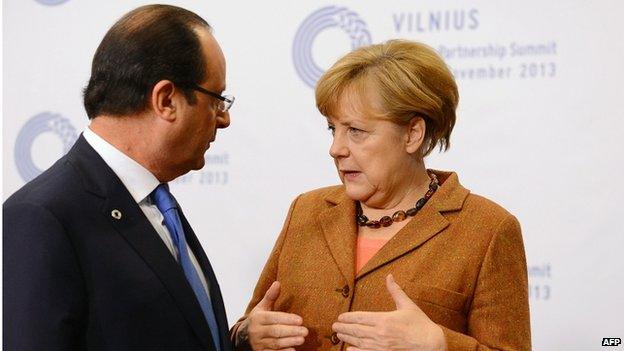Banking union: A giant step for Europe?
- Published
- comments

Much will depend on economic trust between France and Germany
Europe stands on the edge of taking one of the most controversial and far-reaching steps since creating the euro. On Wednesday this week European finance ministers will try to agree the details of a banking union. There are deep tensions between certain countries and a marathon meeting lies ahead.
At the most basic level the desire is to break the "doom loop" whereby bank failures are allowed to threaten the financial health of governments such as occurred in Ireland. The aim is that taxpayers should never again bail out the banks. Over the main years of the crisis, European governments risked a staggering 1.5tn euros (£1.3tn; $2tn) propping up the banks.
But the ambition is much broader than that. It is to give European authorities the power to supervise banks and wind them up. A banking union will involve giving up another chunk of sovereignty and, to a degree, sharing the risks of other countries' banks. It deepens economic and monetary union.
The easier part has already been agreed. By the end of 2014 the European Central Bank will have taken responsibility for supervising the eurozone's major banks. Over the next 12 months there will be a comprehensive stress test of the zone's top 130 lenders. The aim - after many half-hearted attempts - will be to discover the true health of Europe's banking system.
And then come the harder questions: who will decide a bank has to be wound up and, critically, who will pay?
Who pays?
Many smaller countries believe that the decision to wind up a failing bank should be taken by an EU-wide institution and that means the Commission. The Germans favour the decision being taken by finance ministers. There may be room for compromise but the British, who will not be part of this, are sceptical. One senior official said the plans were too complicated and underestimate what a resolution authority should entail. Decisions on winding up banks often have to be taken rapidly over a weekend.
Dominic Laurie demonstrates the progress of countries' economies since the start of the eurozone crisis
The most divisive issue is the question of who will pay. Very broadly the Germans envisage each country taking responsibility for its own failing banks. The French, on the other hand, support a single EU-wide rescue fund.
One principle has been agreed: that shareholders, bond holders and even large depositors will be first to lose money.
The plan envisages - certainly initially - home countries setting up a fund paid for out of fees from the banks. The idea is that these national funds would be merged into one Single Resolution Fund over ten years with a pot of 55bn euros. So gradually, over time, the risks would be mutualised and that would be a huge step for the eurozone.
Unresolved is what would happen in the short term whilst this fund was still being established. Where would be the back stop? Should governments, on behalf of failing banks, be able to tap the European Stability Mechanism, the zone's main bailout fund? The Germans are very reluctant to agree to that.
So the arguments over a common fund are far from settled. The Germans remain resistant to sharing the liabilities of other country's banks. They are wanting countries to accept economic "contracts" before signing off on a Single Resolution Mechanism.
And that brings us to politics and the big question of the day.
UK sidelined
Angela Merkel will be sworn in as chancellor on Tuesday having formed a coalition with the Social Democrats. The question is whether the Social Democrats will soften a third-term Merkel. The government in Paris desperately hopes so. It is gambling on Berlin showing more solidarity.
Never, in recent times, has Berlin been so pre-occupied with the performance of a French government. There is a lot of angst over whether the Hollande team is serious about deep reforms to the labour market. The tensions are real but there are large incentives to agree on a banking union.
Where does this leave the UK? On the sidelines. It will not pay into the resolution fund or be part of the banking union. But the UK will insist on equal treatment for insiders and outsiders. There is a lot of talk in London reminding the European Commission that it is the guardian of the treaties not just for the eurozone but for all 28 members. For the UK going forward there is a huge doubt that lies unanswered: can the UK guarantee equal treatment for itself when others are pushing for closer integration and are heading to a different destination?
Banking union underlines a lesson from the eurozone crisis, that in order to make a single currency work there will have to be closer integration, a further pooling of sovereignty and, to a degree, a sharing of risk, and countries like Germany taking on greater responsibility for the zone's weaker economies.
A final thought. Negotiations over the legal structures of a banking union have proved difficult and tortuous. But solving the eurozone's banking problems will also be a challenge. Take, for instance, the ambition to break the link between governments and their banks. During the past three years both Spain and Italy have been selling debt to their own banks. So Italian banks now hold over 400bn euros of eurozone debt compared with 250bn euros in late 2011. The link between governments and banks is far from being broken.